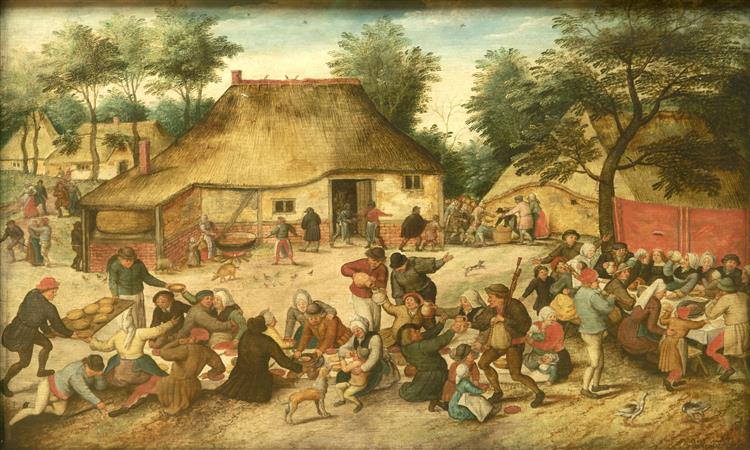Description
The peasant wedding, created by Pieter Brueghel the young man, stands as a fascinating representation of rural life in the context of the 16th century, a period in which culture and peasant traditions acquired special relevance in European art. This work, which illustrates with a remarkable realism and detail a bridal banquet, embodies the festive spirit and the community that mark these types of celebrations. Through its composition, vibrant colors and the diversity of characters, Brueghel the young man invites us to immerse ourselves in a world where joy and daily life are intertwined intricately.
The disposition of the elements in the painting reveals a deep understanding of the visual narrative. In the center of the table, the bride and groom stand out; The bride, dressed in a white mantle, and the boyfriend, which is shown in a somewhat more relaxed posture, suggest the formality of the occasion. Around it, a multitude of guests is grouped, each with an expression and gesture that brings character to the scene. This use of the human figure is a testimony of the Brueghel approach the young man in capturing the diversity of human experience, from joy to the fatigue that the banquet could have generated in the attendees.
Colors play a crucial role in the work. The palette used is rich and varied, predominating warm terrible tones that evoke the simplicity and authenticity of rural life. The characters' clothing are rich in nuances, contributing to the vibrant atmosphere of celebration that is breathed in the scene. The use of lights and shadows adds depth and dimension, causing the scene to seek life to the viewer's eyes. This skilled color and light management is a reflection of Brueghel's distinctive style, which often favored a colorful and detailed representation of everyday life.
The characters that populate the peasant wedding are an amalgam of different archetypes of rural society. From children who play among adults to the elderly who observe with satisfaction the celebration, the work captures a snapshot of community life and the interpersonal relationships that take place in such events. It is interesting to note that, although it is a work of celebration, Brueghel the young man also allows the public to glimpse the difficulties and tiredness of peasant life, a duality that confers a greater depth to the work.
In addition, it is relevant to mention the importance of this piece in the legacy of flamenco art, especially in the context of his father's work, Pieter Brueghel el Viejo, who also explored similar issues. Although Brueghel the young man dedicated himself to reproducing and reinterpreting his father's works, his style has his own energy that reflects his own time and his own environment. The peasant wedding stands not only as a simple image of a festive event, but also as a comment on the reality of the peasant world that, through the centuries, continues to resonate in contemporaneity.
In conclusion, Pieter Brueghel's peasant wedding is more than a mere representation of a social event; It is a window to the dynamics of rural life in its time, a reflection of community values and a testimony of the ability of art to capture ephemeral moments of joy and coexistence. The meticulosity of its composition, the vibrant use of color and the rich diversity of characters not only make this work a monument at the time it was created, but also consecrate it as a fundamental piece of European artistic heritage, inviting several levels of Interpretation and appreciation.
KUADROS ©, a famous paint on your wall.
Hand-made oil painting reproductions, with the quality of professional artists and the distinctive seal of KUADROS ©.
Reproduction service paintings With a guarantee of satisfaction. If you are not completely satisfied with the replica of your painting, we refund your money 100%.

